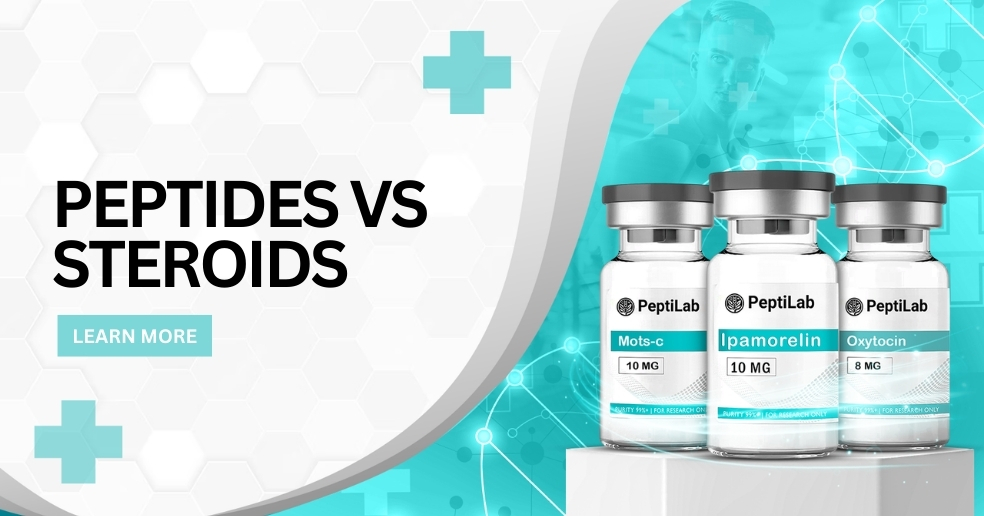Peptides
Peptides vs Steroids Which One is Safer for Gains
In the world of fitness, bodybuilding, and performance enhancement, two commonly discussed substances are peptides and steroids. Both have significant effects on muscle growth, strength, and recovery, but they function differently and carry varying risks and benefits. If you’re considering enhancing your athletic performance or overall physique, understanding the differences between peptides and steroids is essential.
This article explores the fundamentals of peptides and steroids, their benefits and risks, and which might be the better choice for your fitness goals.
What Are Steroids?
Steroids, specifically anabolic-androgenic steroids (AAS), are synthetic derivatives of testosterone. They are designed to enhance muscle growth, increase strength, and improve performance by mimicking the effects of natural male hormones. However, they come with significant risks and side effects when misused.
Common Steroids Used in Fitness
- Testosterone Enanthate – Increases muscle mass, strength, and endurance.
- Dianabol – Rapid muscle growth and strength enhancement.
- Anavar – Enhances lean muscle gains with minimal side effects.
- Trenbolone – One of the most potent steroids for muscle building.
- Deca-Durabolin – Improves joint health and muscle recovery.
Key Differences
To understand how peptides and steroids compare, let’s examine their differences based on various factors.
| Factor | Peptides | Steroids |
| Mechanism of Action | Stimulate natural hormone production | Mimic testosterone effects |
| Muscle Growth | Gradual muscle growth | Rapid muscle mass increase |
| Fat Loss | Supports fat metabolism | Some aid in fat reduction |
| Recovery Benefits | Enhances healing and repair | Helps recovery but with more strain on organs |
| Side Effects | Fewer side effects, often mild | High risk of hormonal imbalances and organ damage |
| Legal Status | Generally legal in many countries | Often banned in sports and illegal without a prescription |
| Long-Term Safety | Safer with proper use | Higher risks with prolonged use |
Benefits of Peptides
Peptides offer several advantages for fitness enthusiasts and athletes:
- Stimulate Natural Growth Hormone Production: Unlike steroids, which introduce synthetic hormones, peptides boost the body’s own hormone levels, reducing the risk of suppression.
- Improve Recovery and Healing: Many peptides aid in muscle recovery, tissue repair, and injury healing.
- Lower Risk of Side Effects: Compared to steroids, peptides have fewer side effects, making them a safer option.
- Enhance Fat Loss: Some peptides improve metabolism and fat-burning processes.
- Support Joint and Ligament Health: Peptides like BPC-157 and TB-500 are excellent for injury prevention and recovery.
- Improve Sleep and Cognitive Function: Some peptides, such as CJC-1295 and Ipamorelin, help enhance deep sleep and mental clarity.
Risks of Peptides
Although peptides are considered safer than steroids, they are not completely risk-free:
- Injection Risks: Most peptides require subcutaneous injections, which may lead to infection if not administered properly.
- Hormonal Imbalance: Overuse of peptides can cause hormonal fluctuations.
- Temporary Effects: Peptides work by stimulating natural processes, meaning results may take longer compared to steroids.
- Potential Water Retention: Some peptides cause temporary bloating and water retention, affecting definition.
- Unknown Long-Term Effects: Since research on some peptides is still ongoing, long-term impacts remain uncertain.
Benefits of Steroids
Steroids are widely used due to their ability to dramatically enhance muscle mass and strength. Their main benefits include:
- Rapid Muscle Growth: Anabolic steroids lead to fast and significant muscle gains.
- Increased Strength and Performance: Many athletes use steroids to boost endurance and overall power.
- Improved Protein Synthesis: Steroids increase protein production, leading to faster recovery.
- Boosted Red Blood Cell Count: Some steroids enhance oxygen delivery to muscles, improving stamina.
- Enhanced Aggression and Drive: Some users experience an increase in focus and aggression during workouts, allowing for more intense training.
Risks of Steroids
Despite their effectiveness, steroids carry serious risks:
- Hormonal Disruptions: Steroids can cause testosterone suppression, leading to issues like infertility and gynecomastia (male breast growth).
- Liver and Kidney Damage: Long-term use can lead to organ damage, liver toxicity, and kidney stress.
- Cardiovascular Risks: Steroids increase the risk of high blood pressure, heart disease, and cholesterol issues.
- Psychological Effects: Many users experience aggression, mood swings, and depression.
- Legal Consequences: Steroids are banned in most sports and illegal without a prescription.
- Risk of Addiction: Some individuals become dependent on steroids, leading to long-term hormonal dysfunction.
- Acne and Hair Loss: Steroids can trigger severe acne and accelerate male pattern baldness.
Peptides vs. Steroids for Specific Goals
When it comes to muscle growth, steroids provide rapid and extreme muscle mass gains, but they come with higher health risks. On the other hand, peptides promote gradual, lean muscle development, making them a safer long-term choice.
For fat loss, peptides like HGH Fragment 176-191 and CJC-1295 enhance fat metabolism without negatively impacting hormone levels. Steroids such as Clenbuterol and Anavar can also aid in fat reduction but may lead to side effects like insomnia and cardiovascular strain.
For strength and endurance, steroids quickly increase power and stamina, but they may lead to joint pain and ligament weakening due to rapid muscle growth. Peptides help improve injury recovery and overall endurance without causing excessive strain on the body.
If recovery and injury prevention are your primary concerns, peptides like TB-500 and BPC-157 are highly effective at accelerating healing and reducing inflammation. While steroids may assist with recovery, they can also increase the risk of ligament tears due to sudden increases in muscle strength.
Which Is Better: Peptides or Steroids?
The choice between peptides and steroids depends on your goals, risk tolerance, and long-term health considerations.
- If you want gradual, natural muscle growth, enhanced recovery, and fewer risks, peptides are the better option.
- If you seek rapid muscle gains and performance enhancement, steroids may offer quicker results but come with significant health risks.
For those prioritizing long-term health and sustainable fitness, peptides provide a safer and more effective alternative without the severe side effects associated with steroids.
Final Thoughts
Peptides and steroids both have their place in fitness and bodybuilding, but understanding their differences is crucial. While steroids deliver quick results, they come with severe side effects and legal concerns. Peptides, on the other hand, offer a safer, more natural approach to muscle growth and recovery.
If you want sustainable results with minimal risks, peptides are the superior choice. Explore Peptide Worldwide for high-quality peptides tailored to your fitness needs!

